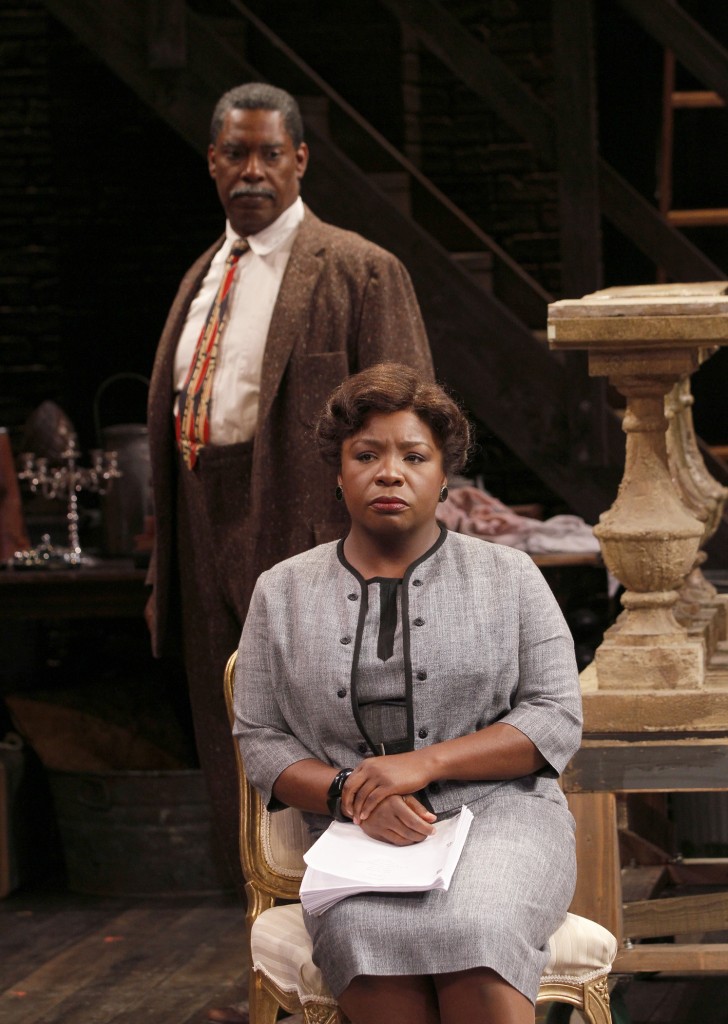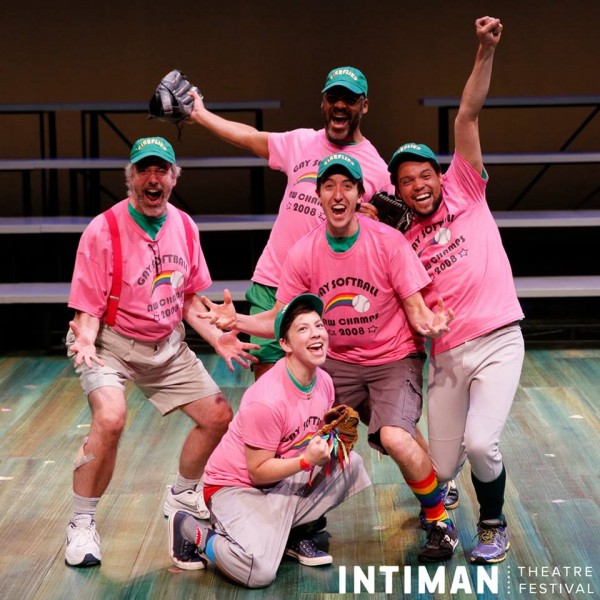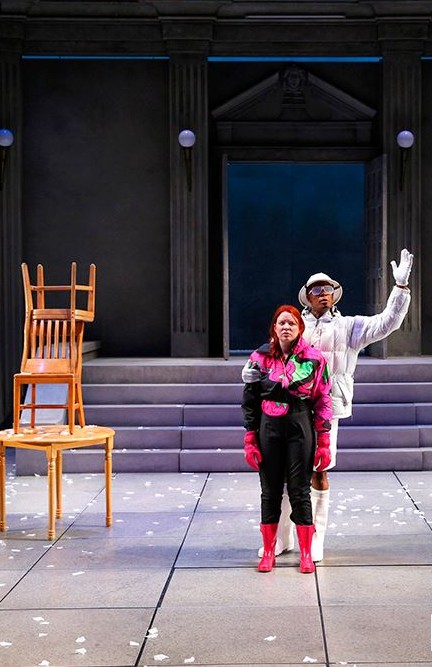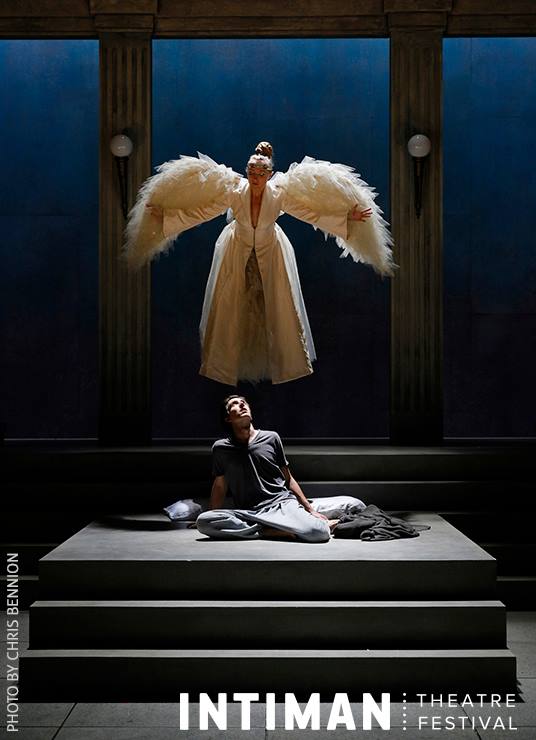
G. Valmont Thomas (Sheldon Forrester), Tracy Michelle Hughes (Wiletta) in TROUBLE IN MIND. Photo by Chris Bennion.
Review: “Trouble in Mind” by Alice Childress. Produced by the Intiman Festival. Directed by Valerie Curtis-Newton. With Tracy Michelle Hughes, Tim Gouran, G. Valmont Thomas, Mark Anders, Shontina “Tina” Vernon, Burton Curtis. In repertory, now through September 15, 2013 at The Cornish Playhouse at Seattle Center (former Intiman Theater)
Review: “Lysistrata” by Aristophanes. Produced by Intiman Festival. Choreography by Amy O’Neal. Directed by Sheila Daniels. With Shontina “Tina” Vernon, Charles Leggett, Marty Mukhalian, Tim Gouran, Kamaria Hallums-Harris. In repertory, now through September 12, 2013 at The Cornish Playhouse at Seattle Center (former Intiman Theater)
It’s very evident that director Valerie Curtis-Newton has a strong affection and respect for the work of African American playwright, author and actor Alice Childress. It was evident in Ms Curtis-Newton’s curtain speech at last week’s premiere of Ms Childress’ play “Trouble in Mind” one of the four productions in this season’s Intiman Festival playing in repertory through September 15, 2013. The director was obviously emotional and proud of the work the company had done on the production. It was also evident on the stage once the play began. “Trouble in Mind” is a lovingly directed, acted and designed tribute to the work of Ms Childress and the themes behind her play. Obviously using her own experiences as an actress working in the theater in the early/ mid 20th century, Ms Childress has crafted a tender and bittersweet look at what it meant to be an African-American artist working in a time when the choicest roles offered to black actors usually involved portraying a slave, a servant and/or a simpleton. The play focuses on Wiletta, a middle aged actress just beginning rehearsals for a Broadway play and despite the fact the director of the play assures her that this role and this play is a step forward in the fight for Civil Rights, it’s nothing more than a token step and Wiletta is once again playing a stereotyped “Mammy” role in a production that’s ill conceived and more than just a little bit offensively racist.
Wiletta is the heart and soul of “Trouble in Mind” and Tracy Michelle Hughes’ beautifully nuanced performance is a delight, carefully balancing the anger and bitterness of the character with the caustic humor and a flickering hope that things might get better. It’s very evident that Wiletta is a role that resonates strongly not only with the director of this play, but the actress who so successfully plays it as well. It’s a bravura performance.
She’s matched by the strong work of G. Valmont Thomas as another older actor, Sheldon who has also played “the game” to survive in a world that demands black people to be “respectful” to those in power. While Sheldon isn’t ready or willing to buck the system, like the character of Wiletta, he’s definitely starting to chafe under its constraints. Mr. Thomas is very adept at playing the obviously humorous aspects of the role; Sheldon chooses to be a bit of a clown, but the more serious moments, when the character lets his guard down, are emotionally powerful and persuasive. From a dramatic and literary standpoint, the Act II moment when Sheldon delivers a long and powerful speech about witnessing a lynching when he was a child, seems a bit forced and heavy handed, but Mr. Thomas’s riveting performance is powerful and authentic.
There’s strong work from Shontina “Tina” Vernon as the sassy younger actress Millie but that character, as well as most of the other characters on stage, aren’t as written as strongly or persuasively as Wiletta, a weakness of this play. The primary white character in “Trouble in Mind” is the director, Al and while Tim Gouran is effective in the role, he also reads a bit too young to be as compelling as the more strongly written African-American characters and he’s not a sufficiently strong enough foil to the Wiletta character.
From a design perspective, there’s a terrific stage set from Jennifer Zeyl that recalls the look, feel and aesthetic of a 1950s theatrical production. Melanie Taylor Burgess has created some gorgeously appropriate and authentic costumes and there’s an appropriately theatrical lighting design from Andrew D. Smith that subtly comments on and highlights the theatricality of the play. It’s a handsome looking production.
“Trouble in Mind” isn’t a perfectly written piece of theater; as previously mentioned, most of the supporting characters and plot lines are underwritten and developed. But, the passion of Ms Childress for this material and her lovingly created central character of Wiletta overshadow those structural weaknesses. Ms Curtis-Newton’s strong staging and the powerhouse performance of Ms Hughes make this Intiman Festival’s strongest player in its 2013 season. You’re strongly encouraged to check it out.

Shontina “Tina” Vernon desperately searches for a coherent script in Intiman Festival’s production of Aristophanes’ “Lysistrata”. Photo: Intiman Festival
The biggest “name” in Intiman Festival’s 2013 is a very old one…Aristophanes’ “Lysistrata” the Greek classic about the women of Greece denying their men any sex until an endless war is peacefully terminated. But, Intiman and director Sheila Daniels have updated their take on this very old anti-war play by setting it in a contemporary setting and framing the play with an interesting premise: a troop of modern soldiers stationed in Afghanistan are staging a production of “Lysistrata” for the entertainment of their fellow troops. The production within the production features amusingly constructed costumes, sets and props from items at hand and the actual presentation of the show is interrupted at times by the intrusion of enemy fire. The troops have adapted the material to fit a more contemporary setting and features musical numbers of current pop songs. On paper (or a computer monitor) it’s a pretty clever idea.
In actuality, it’s a huge, heavy handed mess. It would have been equally effective, and far cheaper, to just lower a pantomime horse onto the stage and have the actors beat it with sticks for an hour and a half. This “Lysistrata” is coarse, derivative, puerile and ultimately, banal and dull. Yes, the original material is very “naughty”…the Greeks liked their dirty jokes and endless schtick involving boners and blue balls, but all sense of subtlety is abandoned in exchange for a barrage of junior high level comedy involving the reproductive act. Aristophanes has been thrown out the window to be replaced by a not particularly clever script for “Family Guy”.
I should correct myself…it would have to be a “Very Special Episode” of “Family Guy” due to the maudlin and heavy handed ending tacked onto this production where the “real world of war” intrudes on this merry farce and there’s a very protracted scene involving blood, death and the horrors and futility of war. It wasn’t moving…it felt contrived and fake, and the work of overly earnest college sophomores trying to make a point that was apparent to start with. We KNOW war is bad; it’s not necessary to hit us over the head with it. Aristophanes must be spinning around in Hades right now, frothing at the mouth…I don’t think he would approve.
The blame can rest solely on the script. No one is directly credited for the adaptation but Ali el-Gasseir is credited as Dramaturg so I’m guessing it was a collaboration between director Sheila Daniels and Mr. el-Gasseir. Personally, I think they need to leave this production off their respective resumes.
From a design perspective, the show is cleverly executed. The “DIY” aspect of the show within a show is charmingly realized by the set design of Jennifer Zeyl; the costume design of Harmony Arnold; lighting design of Andrew D. Smith and Matt Starritt’s evocative sound design. It’s terrific from a visual standpoint.
The actors are required to be as heavy handed as the dismal script and only Tim Gouran and Kamaria Hallums-Harris really get a chance to shine in their scenes together. It’s the rare moment in the show that felt natural and not forced and the charm of the actors and their natural chemistry worked very well together.
If it’s not evident, I really disliked this production and even with a few saving graces, I can’t recommend it. And, as a fan of ribald, even profane humor and entertainment, it’s pretty damning when I come down hard on something for overdoing it. Yes, it’s ok to be gross and vulgar and tacky on stage, but at the heart of it, there needs to be some substance to all the vulgarity. It also helps to actually just be FUNNY.















